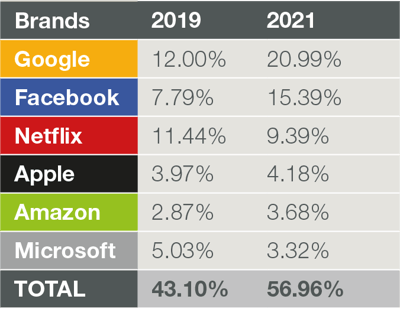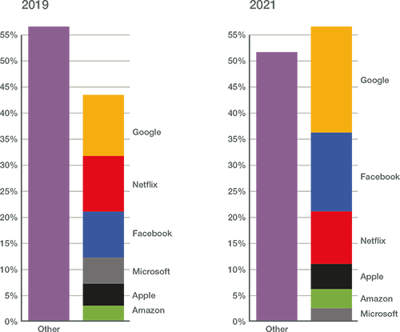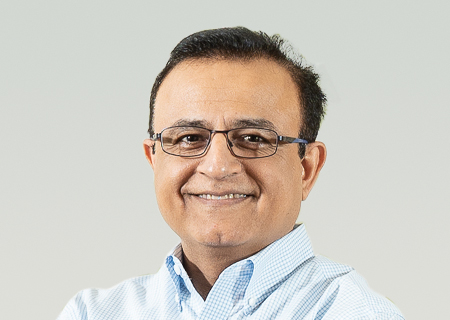My last blog talked about how integral the biggest apps and platforms are becoming to our lives, and our latest research for our upcoming 2022 "Global Internet Phenomenon Report" takes this a step further by showing that the top-6 – Google, Facebook, Netflix, Amazon, Microsoft, and Apple – are generating more than 56% of global network traffic. For the first time, the biggest digital players account for more traffic than everyone else, combined!
 With the scales tipping, communications service providers (CSPs) are realizing this is a watershed moment: they must deliver the benefits of 5G, cloud, the IoT, AR/VR, AI, and the metaverse, and they must assure QoE for the next generation of apps.
With the scales tipping, communications service providers (CSPs) are realizing this is a watershed moment: they must deliver the benefits of 5G, cloud, the IoT, AR/VR, AI, and the metaverse, and they must assure QoE for the next generation of apps.
The expectations in the near future will be very different than those today. The shift to more mission-critical enterprise and industry services will trigger a need for flawless connectivity and optimal performance for manufacturing robotics, remote healthcare, autonomous driving, public safety, and other critical services.
These pressures are driving CSPs to rethink digital-era business models. Just recently, the CEOs of Deutsche Telekom, Vodafone, and 11 other influential service providers published an open letter stating that “a large and increasing part of network traffic is generated and monetized by big tech platforms.” They called out the fact that it is the telecommunications sector that is shouldering the “continuous, intensive network investment and planning” that ultimately drives the unprecedented profitability of the biggest tech brands.
 According to Reuters, the investments in Europe's telco sector rose to 52.5 billion euros ($59.4 billion) last year, a six-year high. Those investments include the networks, 5G trials, licenses, planning, and deployment that fuel app QoE. In return, telcos get modest usage fees.
According to Reuters, the investments in Europe's telco sector rose to 52.5 billion euros ($59.4 billion) last year, a six-year high. Those investments include the networks, 5G trials, licenses, planning, and deployment that fuel app QoE. In return, telcos get modest usage fees.
In addition to wanting a fair ROI for their substantial investments, CSPs also want to protect their networks and brands. The recent Facebook, AWS, and Tesla outages demonstrated how pronounced and far reaching the impacts on networks can be now that apps and services are far more intertwined and interdependent than ever before. QoE for both related and unrelated apps and services were affected.
Left in the wake of these outages and slowdowns were confused and angry people and businesses, including unhappy advertisers, social influencers, institutions, and governments. Still unknown are the long-term effect on brands — those of the underlying networks, and those of the digital apps. Generally speaking, unhappy people or businesses are more apt to swap out network providers than they are their favorite apps and platforms.
For these reasons, CSPs need predictive insights that help identify macro trends across their millions of subscribers, billions of devices, and thousands of applications to answer key questions that can drive business actions and outcomes, such as:
- Which apps are consuming and generating the most traffic, downstream and upstream?
- What’s the impact of app complexity in terms of mashups, embedded video, payments, chat, and other features?
- How are QUIC, HTTP/3, iCloud Private Relay, and encryption affecting the network?
- Who are the “heavy users” in the upgrade from 4G to 5G?
These are just some of the questions we explore in detail in our upcoming "Global Internet Phenomenon Report", which comes out in January. We also continue to develop more advanced machine learning-based techniques to classify downstream and upstream application traffic with greater granularity, addressing the biggest challenges in 5G and cloud growth, capacity planning, operations, service development, and customer care.
To learn more about optimizing networks and assuring Application QoE in the digital era, download the IDC Vendor Spotlight, and feel free to contact us to learn more about our Application and Network Intelligence Portfolio, 5G Service Intelligence Engine, and Analytics.
Subscribe to our blog for quarterly updates!
Topics: Big Data, QoE, Quality of Experience, Customer Experience, 5G, DX, CX, Service Assurance





